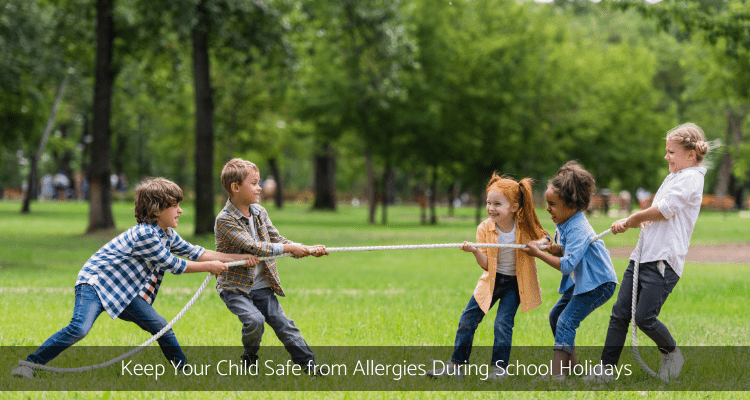The end of year school break is here and you are probably planning fun activities for the kids such as camping or swimming lessons. If your child suffers from allergies, then sending him/ her to a new environment can be nerve wrecking. You may have a method in place for dealing with your kid’s allergies while he/ she is at school and at home, you will however need to put in additional thought to keeping your child safe from allergies during school holidays.
As this infographic (below) from Australia Wide First Aid shows, allergies among children in Australia are among the highest in the world.
Don’t let allergies ruin your child’s school holidays. Here is a list of things that you can do to keep your child safe from allergies as he/she enjoys the sunny outdoors.
1. Find out details about the camp: If you are sending your child for an overnight or extended camping trip, speak to the camp director on the following –
- Who will be the primary adult caretaker for your child?
- Who is the healthcare person accompanying the tour, and their credentials / experience in dealing with children with allergies?
- Who will be responsible for administering your child’s personal allergy prescriptions in case of an emergency?
- How will the camp monitor your child’s food intake as per your specific instructions?
- Where is the nearest medical centre from the camp site and how long does it take to get there?
2. Inform the camp staff of your child’s allergies: Share your child’s allergies and the precautions needed to prevent an allergic reaction. This information should be provided in written as well as in a face-to-face meeting with the camp director. Ask for an introduction to the camp staff responsible for taking care of the children during the tour. Share your concerns with each of them as well. Assess the ability of the camp organizer and the staff to pay attention to your child’s needs before taking the decision to send him/ her to camp.
3. Prepare your child: Even if your child already knows what foods he/she can eat, it’s a good idea to reiterate the safe and unsafe foods, symptoms of an allergic reaction, and how to read a food label (e.g. at the camp candy store). Share information on who he/she should contact while at the camp the moment he/she experiences an allergic reaction. If it’s an overnight trip, pack adequate safe foods for your child’s consumption, and remind him/her to avoid eating anyone else’s snack or food served at the camp. If your child can self-administer the EpiPen, double-check its expiration date and remind him/her to have it with them at all times.
It is difficult to trust someone else to take care of your child, especially when your child has severe allergies. Don’t hesitate asking questions or making suggestions. Sharing as much information as possible with those responsible will help keep your child and other children safe from allergies.
What activities are you planning for your child this summer? What precautions do you take to keep him/ her safe from allergies?
Author
-
We’re glad you’re here. We’re Carol and Tony, founders of one of the longest running Healthy Home Blogs in the world, Mitey Fresh Australia. We’ve been on this journey for the last 25 years and are passionate about helping families sift through health hazards and triggers like allergens, mould, water damage, chemicals and EMFs, to get clarity about what’s toxic and what’s not so they can create a healthy and happy home for their family they love. Each month, people visit this blog seeking focus on the health and wellbeing of their loved ones, sustainable and effective practice tips and guides, to help create and manage healthier indoor spaces, improve the built environment that is pleasing to the senses and support healthy living and nature, every day. Starting this blog was to help change people’s lives, one family at a time, and we can’t wait to share how its allowed us to stand next to you and show you how interpreting these synergies between buildings and the environment they are built in will impact upon the health and well-being of those who occupy them. Find out more about Healthy Homes and what this blog can do for you!





